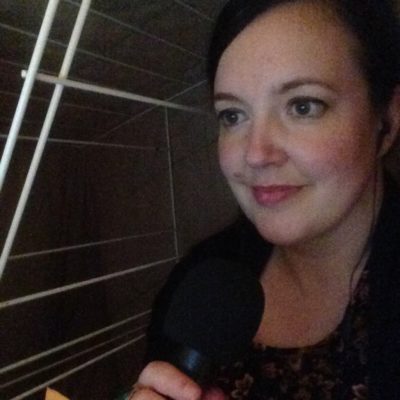| (00:10) |
Music |
[Piano Overlaid With Distorted Beat] |
| (00:10) |
Hannah McGregor |
Welcome to SpokenWeb ShortCuts. Each month on alternate fortnights (that’s every second week following the monthly SpokenWeb Podcast episode) join me, Hannah McGregor and our minisode host and curator Katherine McLeod for SpokenWeb‘s ShortCuts mini-series. We’ll share with you specially curated audio clips from deep in the SpokenWeb archives to ask: what does it mean to cut and splice digitally? What kinds of new stories and audio criticism can be produced through these short archival clips? An extension of the ShortCuts blog posts [Sound Effect: Wind Chime] on SPOKENWEBLOG, this series brings Katherine’s favourite audio clips each month to the SpokenWeb Podcast feed. So, if you love what you hear, make sure to head over to spokenweb.ca for more. Without further ado, here is Katherine McLeod with SpokenWeb ShortCuts, mini stories about how literature sounds. |
| (01:14) |
Katherine McLeod |
Welcome to ShortCuts. This season of ShortCuts we’ve spent some time in a recording of American poet Muriel Rukeyser. [Start Music: Piano Overlaid With Distorted Beat] We’re going to stay in that recording, immersing ourselves in it, for one more minisode. We’re going to do that for two, no three, reasons: one, this recording lets us talk about spontaneous and unexpected moments that can happen during a reading and then end up being recorded; two, this recording lets us reflect on what this medium of a minisode on a podcast feed can do to create connections; and, three, this recording lets us continue to ask the question taken up in the past two minodes: How can we hear time? [End Music: Piano Overlaid With Distorted Beat]. With that, let’s begin our archival listening to specific clips in the reading by Rukeyser. |
| (02:08) |
Spoken Web Podcast Theme Music |
[Instrumental Overlapped With Feminine Vocals] |
| (02:08) |
Katherine McLeod |
On a cold January night in 1969, Muriel Rukeyser started her reading in Montreal by asking the audience to consider … |
| (02:27) |
Audio Recording, Muriel Rukeyser, Montreal, 1969 |
And as you get a very, very rainy evening, why do people come and listen to poems? Well, you’ve got some marvelous summer night. Why do people come and listen to poems? |
| (02:37) |
Katherine McLeod |
In minisode 2.2 we listened to those opening remarks and we thought about how it creates a relationship between the listener and the poet, or really between the listener and the event of the reading. One of the poems she read that night was “Anemone.” |
| (02:53) |
Audio Recording, Muriel Rukeyser, Montreal, 1969 |
“Anemone. My eyes are closing, my eyes are opening, you are looking at me with your waking look…”
|
| (03:04) |
Katherine McLeod |
We listened to that poem in minisode 2.4 as a way of hearing the relationality that she spoke of as being created through the poetry reading, and how it was enacted through that poem. We also considered how an archival listening creates a connection between the past and present. Rukeyser’s critique of nuclear testing in 1969 speaks very much to our current climate crisis. |
| (03:30) |
Katherine McLeod |
After making those minisodes, I shared the link, I tweeted it out, and I was elated to see a notification [Sound Effect: Phone Notification]: “Muriel Rukeyser has liked your post” No, it wasn’t Rukeyser herself haunting my Twitter feed, but it felt as though she had heard it – it was the Twitter account of the archival project, Muriel Rukeyser: A Living Archive. They had listened to ShortCuts and were excited about the recording that existed of Rukeyser – a recording that they had not yet been aware of. |
| (04:01) |
Katherine McLeod |
Muriel Rukeyser: A Living Archive is holding a symposium during the same week when this minsode will go live – the entire symposium is based around Rukeyser’s series of “Elegies.” I assumed that there would be many recordings of Rukeyser reading from “Elegies” but it turns out that there are not – in fact, there might be very few – or even one. I know there is because, yes, it is on that very same 1969 reading by Rukeyser here in Montreal. Not only does this recording have a rare sound in that Rukeyser reads from “Elegies” but also when she introduces it she notes that she has never read it like this before. She cuts it up, and we’ll listen to her read the poem “Elegy in Joy” as our short cut [Sound Effect: Scissors Cutting] this month… |
| (04:55) |
Audio Recording, Muriel Rukeyser, Montreal, 1969 |
Here’s one piece of a long poem. It’s the last of a group called “Elegies,” which one hardly dares name anything anymore. It’s called “Elegy in Joy.” And it’s just the beginning piece. I wanted to do it tonight this way. I’ve never cut it up. “Elegy in Joy.” Now green, now burning, I make a way for peace. After the green and long beyond my lake, among these fields of people on these illuminated hills gold, burnt gold, spilled gold and shadowed blue. The light of enormous flame, the flowing wide of the sea. Where all the lights and nights are reconciled. The sea at last. Where all the waters lead and all the wars to this peace. For the sea does not lie like the death you imagine. The sea is the real sea. Here it is. This is the living. This peace is the face of the world. A fierce angel who in one lifetime lives fighting a lifetime, dying as we all die. Becoming forever, the continual God. Years of our time, this heart. The binding of the alone, bells of our loneliness, finding our lines and our music. Branches full of motion, each opening in its own flower. Lines of all songs, each speaking in its own voice. Praise in every grace, among the old same war. Years of betrayal, million deaths breathing its weaknesses and hope buried more deep, more black than dream. Every elegy is the present freedom eating our hearts, death and explosion, and the world unbegun. |
| (07:29) |
Katherine McLeod |
“Every elegy is the present” – what an ending to that poem. But, that is not how the poem ends on the page. However, by choosing to “cut it up,” as she says, she creates a new version — a version in sound — that lets those lines ring out, as though they were the end of the poem. “Every elegy is the present” is a line that reminds me of how she ends the entire reading by asking the audience to encounter the present moment. She reads “The Speed of Darkness” which ends with a question: “Who will speak these days, /if not I, / if not you?” |
| (08:09) |
Audio Recording, Muriel Rukeyser, Montreal, 1969 |
Thinking of the poet yet unborn in this dark who will be the throat of these hours, no of those hours. Who will speak these days, if not I, if not you? [Applause] |
| (08:32) |
Katherine McLeod |
The juxtaposition of those three sounds I find incredibly affecting: the powerful call out to you, the barely audible “thank you very much,” and the roar of applause that goes on for some time. I listen again and again to that… |
| (08:50) |
Audio Recording, Muriel Rukeyser, Montreal, 1969 |
Thank you very much. |
| (08:53) |
Katherine McLeod |
I am in that room and can see her standing at the front with the microphone and her papers; and it is as though the entire room takes a collective breath between the reading and the applause, an in-between space, an in-between sound. That voice who had just spoken these words with such volume: “who will be the throat of these hours?” A phrase that reminds us of the body as the source of sound. This is the same voice, the same body, who wrote and spoke these words within the past year of this reading: “What would happen if one woman told the truth about her life? / The world would split open.” |
| (09:40) |
Katherine McLeod |
Now hear the applause again, all 25 seconds of it. If we listen to it all the way through we hear the announcement of the F.R. Scott reading on February 14th, bringing us back in time to the present moment of the reading, and back to Montreal with F.R. Scott the Montreal modernist. Let’s hear all of that again. |
| (10:07) |
Katherine McLeod |
Who will speak these days, /if not I, / if not you?… Thank you very much… [Full applause for 25 seconds]. |
| (10:46) |
Audio Recording, Unknown Announcer at Muriel Rukeyser Reading, Montreal, 1969 |
We wish to announce that the next reading will be by F.R. Scott and that will be on February 14th at the same time in the theatre in the basement of this building. Thank you. [Audience Background Noise] |
| (10:57) |
Katherine McLeod |
[Start Audience Background Noise Underlaid] As you can hear, the recording doesn’t stop. Nobody presses the button. It continues recording. Now this is the sound of the room, this is the sound of the audience, this is the sound of what it felt like to be there. This recording of the social interactions, even as muffled as there are, conveys the sound of that reading in its time, which is even more interesting to us during our current time of the pandemic when we long for attending an in-person event. We are hearing what Rukeyser has described as defining the poem: the poem as a meeting place. It is a point that Jane Malcolm makes in her brilliant analysis of this recording. Do check the show notes for that reference. And it is a point that I hear again, listening now. A meeting place… |
| (11:53) |
Katherine McLeod |
I think of the conversations that I’ve had recently with Muriel Rukeyser: A Living Archive and I hear it almost as one of these conversations happening after the reading; but, it didn’t happen after a reading, it happened after a listening. That makes me imagine what connections can come of future sound-based criticism as forms like the podcast continue to circulate and to be heard. The podcast, like poetry, relies upon its “moving relations” – to quote a phrase of Rukeyser’s – moving relations within itself and with its listeners. And, to me, it seems that, like poetry, the podcast is a meeting place… |
| (12:41) |
Music |
[Piano Overlaid With Distorted Beat] |
| (12:44) |
Katherine McLeod |
I’m Katherine McLeod, and these minisodes are produced by myself, hosted by Hannah McGregor, and mixed and mastered by Stacey Copeland. Head to SpokenWeb.ca to find out more about ShortCuts and The SpokenWeb Podcast. And head to Muriel Rukeyser: A Living Archive to find out more about the symposium on Feb 19. If you are tuning in after the symposium, thank you for listening and for being part of these connections. Tune in next month for another deep dive into the sounds of the SpokenWeb archives. [Audience Background Noise Continues And Fades] |

